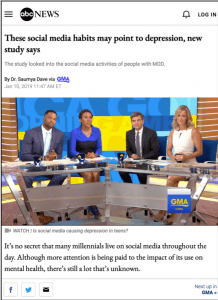Our interdisciplinary published another important study, “Social comparisons, social media addiction, and social interactions: An examination of specific social media behaviors related to major depressive disorder in a Millennial population,” which aimed to identify specific social media behaviors related to major depressive disorder (MDD). Millennials (N = 504) who actively use Facebook, Twitter, Instagram, and/or Snapchat participated in an online survey assessing major depression and specific social media behaviors. The results identified five key social media factors associated with MDD. Individuals who were more likely to compare themselves to others better off than they were (p = 0.005), those who indicated that they would be more bothered by being tagged in unflattering pictures (p = 0.011), and those less likely to post pictures of themselves along with other people (p = 0.015) were more likely to meet the criteria for MDD. Participants following 300+ Twitter accounts were less likely to have MDD (p = 0.041), and those with higher scores on the Social Media Addiction scale were significantly more likely to meet the criteria for MDD (p = 0.031). Participating in negative social media behaviors is associated with a higher likelihood of having MDD.
You can read our study here, which has also been featured on several news outlets, including Good Morning America (see below) and U.S. News & World Report.
